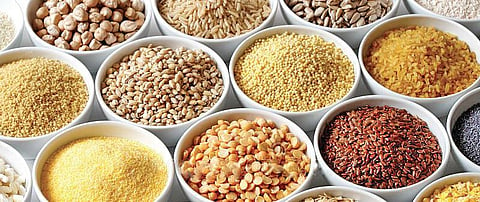

With the ongoing pandemic, information about nutrition and wellness is coming at us from all directions. A host of influencers have sprung up on social media websites, advising people on what to eat and what not. This has not gone down well with qualified dieticians and nutritionists.
“Just like you need to consult a doctor for a disease, you need to talk to a dietician or a nutritionist for information on food,” says Dietician Lavleen Kaur, Co-founder, Diet Insight. “An inspiring story of an individual’s weight loss journey doesn’t qualify him/ her to advise others,” she adds. Kaur tells us more about food and diet in this pandemic:
What should a recovered Covid patient eat?
You need to feed your body proteins, vitamins, minerals, and other essential nutrients to boost the immune system that has fought a tough battle with the virus. Add pulses, legumes, sprouts, dairy, soya, cottage cheese, eggs, and chicken as these are rich sources of protein. Always soak pulses and legumes for a few hours before cooking to reduce the amount of phytic acid (an anti-nutrient) content, which will aid in digestion.
Also include nutrient-dense items like fresh fruits, veggies, nuts, and seeds in your diet. If you are experiencing fatigue or weakness, take one dry fig (anjeer), two dates, and three to four soaked black raisins first thing in the morning. These dried fruits are rich in iron content which helps with a good supply of oxygen to your cells.
After each meal, chew a clove/ a small cardamom/jaggery with one teaspoon of fennel seeds to maintain your blood sugar level and counter the feeling of lethargy. Stay hydrated. To find out if your water intake is good, check the colour of urine – a pale yellow colour shows you are taking enough water. Lack of water can lead to headache, fatigue, and general irritability. Add fluids to your diet like coconut water, herbal teas, soups, and kaadha with traditional Indian spices and herbs to keep the hydration intact.
About 70 per cent of the immune system is housed in the gut. To ensure the digestive system is in good shape include curd, kanji (fermented drink of black carrot/ beetroot), buttermilk and fermented dishes like idli, dhokla, and good old pickles, and fermented chutneys. To boost immunity, consume amla, coconut, barley sattu in buttermilk and lemon. Before you retire for the day, take a cup of milk with a pinch of turmeric as it relaxes muscles. Avoid caffeine, refined and processed foods and take a break from alcohol and smoking.
What does it mean to be truly healthy?
A person cannot be termed healthy just because he doesn’t have any disease. To be declared completely fit the one has to include physical, mental, and social well-being of an individual. If any of the 12 pillars of holistic wellness are compromised, adverse effects can impact other systems, thereby creating a chain of events that can affect overall health.
What are the 12 pillars of holistic wellness?
These can be divided into three primary categories: core, lifestyle, and external. Core pillars regulate the body’s core system critical to maintaining physical health and wellness like digestion, detoxification, hormonal and immunity. Lifestyle pillars are supportive pillars that assist the core pillars in maintaining the overall health of the body. These include diet and nutrition, inflammation, sleep and mental or emotional stress. External pillars are social, environmental, occupational and financial – these can inadvertently affect our mental and physical health status.
What are the easy ways to transform one’s nutrition?
Perform a thorough kitchen analysis because the way towards healthy immunity begins in the kitchen. Revamp your diet with added proteins, fibres and basic nutrients. Add more plant-based food to your meals, consume meat and dairy in moderation. Add barley, sorghum, and finger millets to your diet as they supply essential micronutrients such as magnesium, zinc, calcium, iron, and potassium that wheat alone cannot fulfil. Avoid junk, processed and refined foods like cookies, chips, fruit juices, ready-to-eat foods, baked beans, and breakfast cereals etc. Remember, there is no supplement to freshly cooked homemade food.